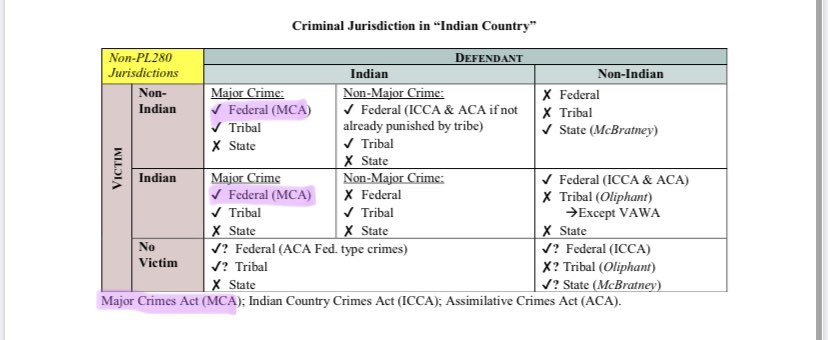
🚨Good Morning!! Pre-Argument 🧵 2 of 3 explaining the constitutional challenges to #ICWA that #SCOTUS will hear today in Haaland v. #Brackeen: Article 1/Congressional Power. 1/16
Congress can only pass a law if the Constitution gives them the authority to pass that type of law. Congress must "have the power" to pass a law, or else the whole law is unconstitutional, & so are all the other laws of that type. 2/16
So it matters a ton what types of laws the Constitution says Congress can pass. In #Brackeen, whether Congress can pass a law that aims to keep Indian children with their families, communities, & culture. 3/16
The Constitution says Congress has the power to pass laws regulating commerce with Indians. #SCOTUS said in 1886 that it would be a “strained” reading for the "Indian Commerce Clause" to support broad Congressional power over Indian affairs. 4/16
But #SCOTUS said, that’s ok, b/c other parts of the Constitution give Congress powers that add up to broad “plenary” power over Indian affairs. Other parts of the constitution about territories, treaties, etc. &, well, conquest gives them power too. 5/16
Congress used this broad power to do lots of bad things to Native people. It’s the same source of power used to break treaties, take l&, & create boarding schools. But, in recent years it’s this same power that’s let Congress change course & pass pro-tribal laws, like ICWA. 6/16
NOT SO FAST! Just as this power is starting to be used to support Indians, in 2004 Justice Thomas wonders aloud if this is a fair reading of the Constitution. Maybe this pro-Indian stuff is unconstitutional. 7/16
(Sidebar: It’s cruelly ironic that this is only a problem now that these laws help, rather than hurt Indian people. Where were these concerns during boarding schools?! And if this reminds you of affirmative action, you’re not alone!) 8/16
In today’s #SupremeCourt, originalism is king. That makes historical evidence from the founding era about what the Constitution means ALL IMPORTANT. It’s the battleground. 9/16
And so this is going to come down to what the Justices make of arguments about the text of the Constitution and the history of the founding era. Enter the historians... 10/16
Two men, Greg Ablavsky and Rob Natleson are debating who has the better read of historical sources or cited the most relevant materials. If Ablavsky is right, Indian law stands. If Natleson is right, almost everything Congress has done in Indian affairs is unconstitutional. 11/16
Slate has a great breakdown of this. But, yes, a fight b/w two white men about historical documents could determine the fate of #ICWA and countless Indian children.
slate.com/news-and-polit…
12/16
slate.com/news-and-polit…
12/16
Full disclosure: Ablavsky is my colleague & friend. But I accepted this job at Stanford because Greg earned my respect & trust. Non-Native scholars can approach Indian law with ignorance, arrogance, & carelessness. Greg doesn't. His work is careful, rigorous, & excellent. 13/16
If Constitutional law nowadays means originalism, we deserve nothing but the most accurate historical accounts. If you screw up, admit it. If you don’t have the best access to sources, or time to do a good job with them, don’t write something. 14/16
I hope the Supreme Court credits Ablavsky’s analysis, and the precedent of ALL OF Indian law thus far. If not, then just like with the EPC challenge, it would make MOST OF INDIAN LAW unconstitutional. 15/16
We enter an era where everything Congress has done w/r/t Indians and tribe & an entire title of the U.S. Code, is constitutionally suspect. Every program for Indians & tribes, from Indian Health Service, to Commodities, to tribal self-determination contracts & reservations. 16/16
• • •
Missing some Tweet in this thread? You can try to
force a refresh





